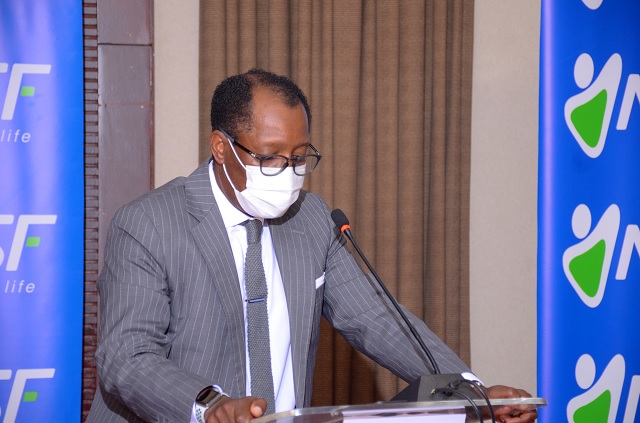
Kampala, Uganda | THE INDEPENDENT | The National Social Security Fund has no plans to review its investment structure even when there are some companies whose shares are not doing well on the stock market.
Some stocks across East Africa’s stock market have lost value since their initial public offer and others since the NSSF acquired shares in them.
In 2019 for example, the Fund reported losing 402 billion Shillings due to what it called exposure in the regional equity market, especially the Nairobi stock exchange.
However, the Executive Director Richard Byarugaba says that restructuring or withdrawing investments in any of the companies they have invested in is not an option.
He says that currently, the total equity (stocks) investment portfolio earns the Fund 13% per year, which is a commendable rate of return, and therefore should not be changed.
He explains that the reason the Fund has investments in different companies and different sectors is to diversify opportunities and risk.
Apart from investing in real estate, the NSSF has shares in leading companies across East Africa’s stock markets, including financial, manufacturing, health and electricity sectors.
Byarugaba says that what matters is that the basket of investments at the end of the year adds to the members’ savings value.
He was speaking at the inauguration of the 12th board of directors of the NSSF, by the Minister of Finance, Planning and Economic Development Matia Kasaija.
The board is chaired by Peter Kimbowa, and includes Patrick Ocailap, representing the Ministry of Finance and Aggrey David Kibenge from the Ministry of Gender, Labour and Social Development.
Others representing the employers and employee’s unions are Peninnah Tukamwesiga, Sam Lyomoki, Bahemuka Julius, Lwabayi Mudiba Hassan, Fred K. Bamwesigye, Eng. Silver Mugisha and the Managing Director, Richard Byarugaba.
Kasaija urged the members to take forward what he called the current stability and reputation of the fund created by the recent boards.
“The job of a member of the NSSF Board is derived from the NSSF Act. It is “to ensure that there is secure, profitable and effective financial management of the Fund for the benefit of the workers in particular and the country at large,” he says.
He says the interest of government is not only to see Ugandans save for their future, but to expand a local source of financing where government can borrow from and reduce on external financing of budgetary needs programs.
On the amendment of the law that allowed mid-term access to benefits, Kasaija said he will soon go to parliament to seek the operationalization of the law.
The amendment allows savers to access up to 20% of their savings, if they have saved for at least 10 years and attained the age of 45 years.
He says it was found necessary to amend the law because it makes sense for one to get some of their money when still energetic.
The new board chairman Dr Kimbowa pledged to strengthen the investment programs and ensure they are more profitable.
“We will ensure transparency and accountability as all individuals and teams within the Fund. Like always, we will rely on your prompt decision making and guidance so that we can ably leverage opportunities both at a regional and global level.”
He also pledged to concentrate on accountability and consultation with management for the good of the Fund.
*****
URN
 The Independent Uganda: You get the Truth we Pay the Price
The Independent Uganda: You get the Truth we Pay the Price



